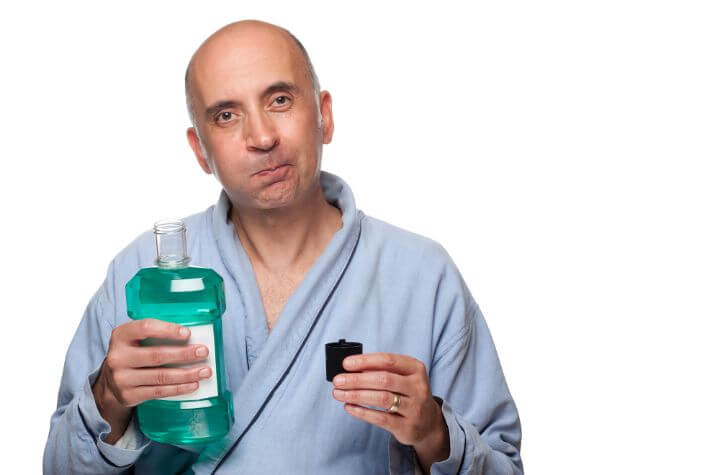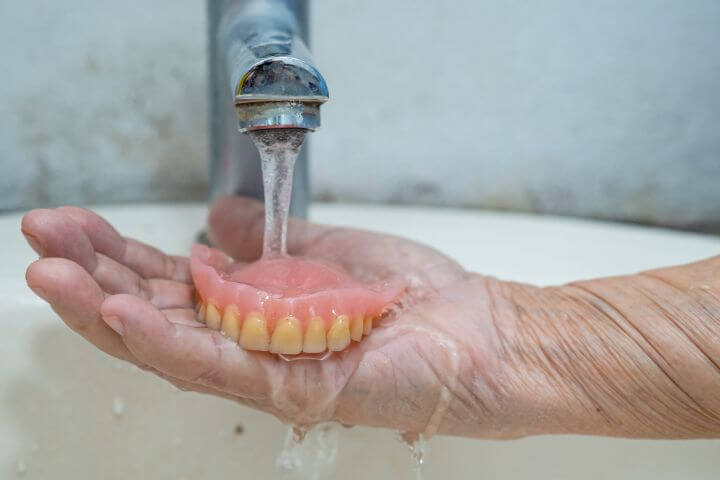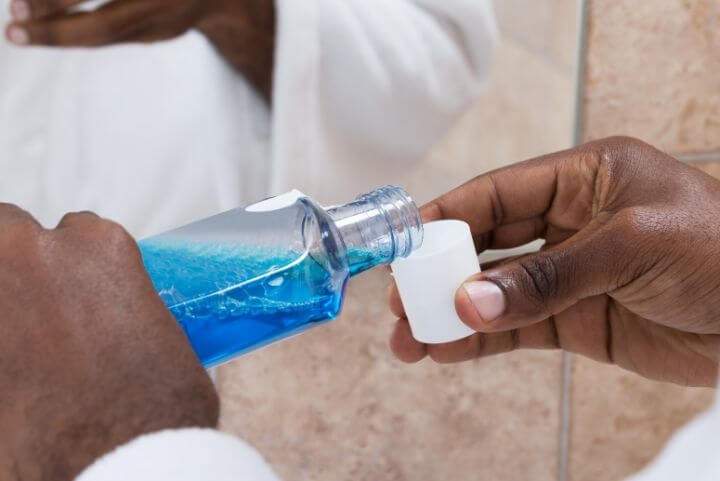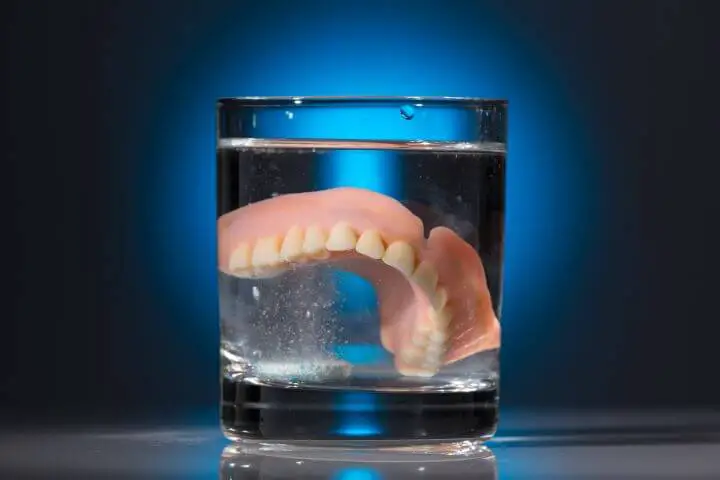Mouthwash is great for freshening up our breath and sometimes adding in that little bit of extra cleaning that we may have missed with our brushing, but when you have dentures you may be wondering if it’s actually safe for you to use regular mouthwash or if you have to use something different.
Contents
So, Can You Use Mouthwash on Your Dentures?
Unfortunately that isn’t a straight answer as there are a few factors that could determine whether a mouthwash is safe for dentures.
Many mouthwash products out there right now will have alcohol, more specifically ethanol, to kill the bacteria in your mouth. Using certain mouthwash products to clean or rinse your dentures is not recommended, so you will need to check if the one you prefer to use has alcohol in it.
What’s the reason for this? Well the material that dentures are made out of is sensitive to the alcohol in the mouthwash. Using mouthwash with alcohol in it may kill the bacteria in your mouth, but it will slowly degrade your dentures over time which can lead to cracking or wearing away at the base of the dentures.
Overall, it isn’t that you can’t use mouthwash at all with dentures, but you do have to be careful about what kind of mouthwash you’re using and what it is made up of.
If you have a kind of mouthwash you prefer to use, you can always check with your dentist to see if it’s safe to use with your dentures.
You might also like to read Must Haves After Wisdom Teeth Removal
How Else Can You Clean Your Dentures?
There is a lot of information out there about cleaning your dentures, and some of it is correct while other ways of cleaning your dentures should be avoided. Here is a bit more information on ways of cleaning your dentures, and whether you should avoid it.
Baking Soda
This common household product is great for cleaning so many things around your home, and it’s a very easy and inexpensive way to get your home clean and sparkling.
While it’s great for cleaning, this commonly found product is really coarse and abrasive. When it comes to dentures, you do not want to use any product that is abrasive as it can break down the quality of your dentures and cause them to crack over time.
Rubbing Alcohol
This is another product that is very commonly found in houses, and is used to disinfect a number of things. Rubbing alcohol, which is also known as isopropyl alcohol, is known for its disinfecting properties and for its ability to kill bacteria.
Unfortunately, though, similar to how the alcohol found in some mouthwashes can harm your dentures this kind of alcohol will also damage the acrylic dentures are made out of. It’s strongly recommended you do not use rubbing alcohol to try and disinfect or clean your dentures.
Putting Your Dentures in the Dishwasher or Microwave
There are many things you can put in the dishwasher or microwave to really get them clean because of the high heat experienced there, but your dentures are definitely not one of them.
Due to the high heat these two appliances give off, your dentures may become warped or even brittle – and eventually crack – so it’s advisable to not use them for cleaning your dentures.
You might also like to read Best Endodontic Motor
Caring For Your Dentures
For most of our lives, we’ve all been used to brushing our teeth and caring for our natural teeth. However, when you’re just getting used to dentures it can be a challenge to properly care for them as there are some things you need to do differently.
Here are a few things to keep in mind when caring for your (new) dentures.
Eating
When it comes to eating, it might take you a little while to get used to eating with dentures as it will feel a little unnatural at first. During the first little while with dentures, it’s best if you avoid eating hard or sticky foods as these can make your denture shift while chewing.
Some experienced denture wearers are able to eat anything they want to, but for most people they will find there are certain things they just can’t eat as they did before. It will take time for you to determine what these foods are for you.
Speaking
You’ve been so used to talking a certain way with your teeth, and having dentures in will change how you form words in your mouth. This will feel weird at first, but the more you do it the better you will become at speaking with dentures. Many people have found that reading out loud will speed this process up, and makes for good practice.
Remove Your Dentures Every Day
It may be an odd habit to get into at first, but removing your dentures every night is paramount to making sure you keep them clean.
Removing them nightly will give you a chance to clean them properly, and also give your gums a chance to breathe without dentures on top of them. If you sleep with dentures in your mouth, you will greatly increase you risk of developing a bacteria infection.
You might also like to read Best Electric Plaque Remover
Cleaning (but Not With Normal Toothpaste)
It’s really important that you do not use regular toothpaste on your dentures. It’s another product that is really grainy and abrasive, which is going to end up being coarse against your dentures.
Using this is almost like taking sandpaper to your dentures, which means they will eventually break down or even change the color of them.
The good news here is that you can purchase tooth paste or cleaning solutions that are specifically designed for use with dentures. They will definitely clean your dentures without causing long-term damage to them.
If you are unsure about the toothpaste you’ve been using, you can always make an appointment with your dentist to see if it’s something you should be using.
Your dentist will also be able to provide recommendations as to what you should be using, and potentially even give you a few samples so you can choose which one you like best.
Nightly Soak
One of the best ways to keep your dentures looking healthy (and keeping them well maintained) is to make sure you soak them every night. Dentures will stay looking their best when they stay moist, so keeping them in a soak every night will definitely pay off.
What do you soak them in? Well, you have a few options. There are solutions you can purchase that especially for soaking your dentures.
You should always soak them in a covered container so that the solution doesn’t evaporate, and you can ensure they are completely emersed in the solution.
It’s important to remember that soaking your dentures is not an appropriate substitute for brushing your dentures, so you need to make sure you do both of these on a daily basis.
You can use mouthwash to soak your dentures but do not soak it overnight. Soaking it for half an hour will do its tricks.
Yearly Checkups
Your dentist will probably want to see you and take a look at your dentures once every year. Dentures are pretty strong, but they aren’t really meant to last forever so you will eventually need to purchase a new set of dentures.
You will probably have to aim to replace them every 6 – 8 years, depending on how well you take care of them.
You may also need to have them realigned to fit your mouth as sometimes it can change, so that is why it’s recommended you see your dentist once a year to have everything checked over and make sure everything is working the best for you.
Using Denture Adhesives
Some denture wearers prefer to use a denture adhesive to keep their dentures in place during the day, and improve retention against the gum.
When it comes to the end of the day, when you’re taking your dentures out, it’s important to make sure you clean all of the adhesive off of them.
Mouthwash will not help remove the adhesive, so it’s important to brush your dentures before using any kind of mouthwash solution on them.
Before putting them into any kind of solution overnight, make sure the dentures are completely clean of any adhesive as a build-up of this material can cause your dentures to not fit over time and warp, which can cause you a lot of discomfort and even pain.
Handling Sore Spots
Many denture wearers will develop sore spots over time with wearing dentures, and this is very normal. If you develop sore spots, you can give your dentist a call as they can relieve your pain in a very short amount of time – often with just one visit.
When it comes to having dentures, there are many every day products that you have to be careful about using that you may have not even thought of using before you had dentures. When it comes to having dentures, make sure you take care of them by using the right kind of toothpaste (nonabrasive and antibacterial), mouthwash (without alcohol) and keeping them healthy by soaking them every night.
If you have any questions about caring for your dentures, give your dentist a call to have a look at them and they will be able to answer all your questions!




